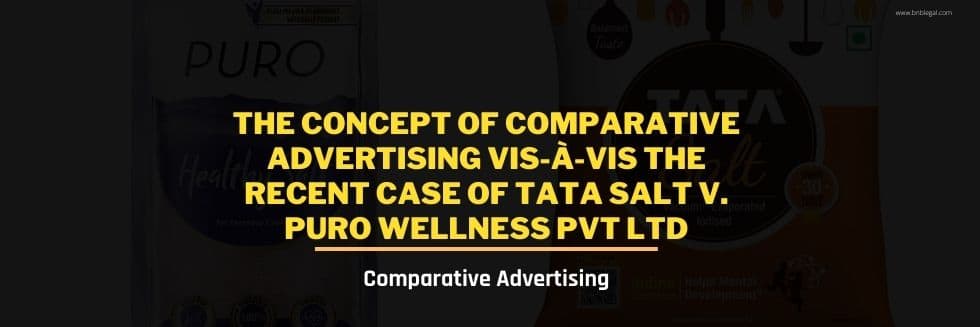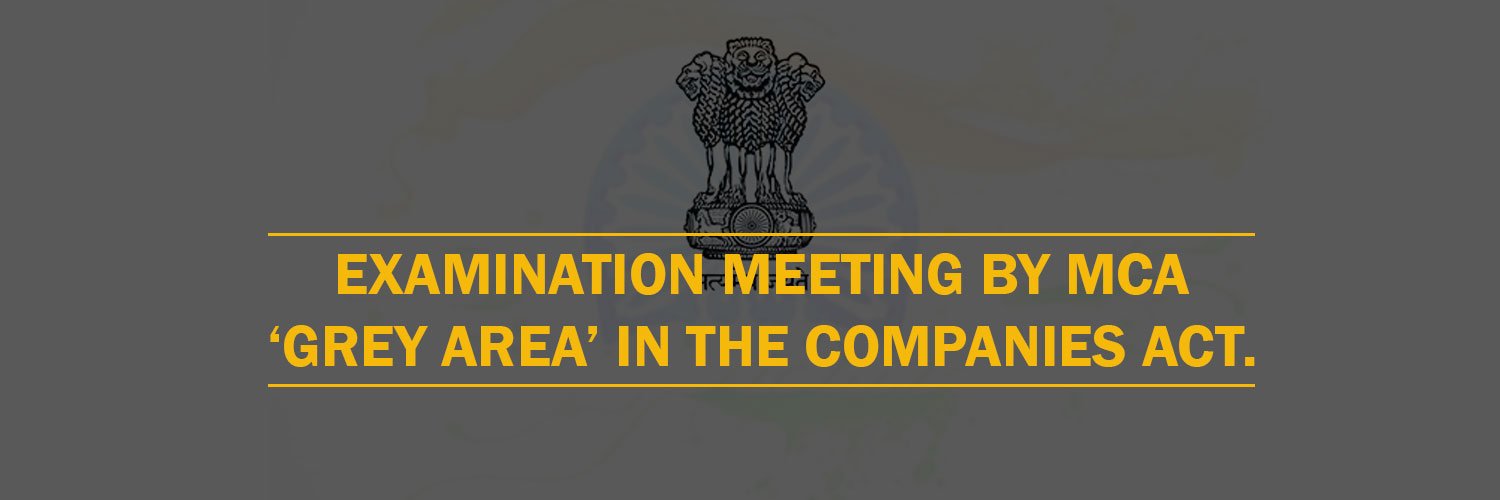Introduction:
Comparative advertising refers to a marketing strategy wherein a company’s product or commodity is showcased as being better than its competitor. The most common form of comparative advertising technique is where two products of rival companies are compared and distinguished side by side, this is done to establish that the product of the company that has created the advertisement is superior to its competitor’s product. In most of these cases, the competitor’s product is presented in a disparaging light.
Tata Sons Pvt. Ltd. Vs Puro Wellness Pvt. Ltd.: About the case:
The dispute was between Tata Sons Pvt. Ltd. and Puro Wellness Pvt. Ltd., Puro Healthy Salt which is rock salt and is pink in colour, aggrieved by one of Puro’s advertisements, Tata Sons filed a case contending that the said advertisement was disparaging to white salt, a product in which Tata Sons is a major player. In the said advertisement, a housewife was seen advocating for the use of Puro salt to her friend by stating to her the benefits of Puro salt over normal white salt.
The Delhi High Court herein referred to the landmark case of Reckitt v. Wipro, The Delhi High Court in the instant case rejected a plea by Reckitt Benckiser (India) Private Limited, the manufacturer of Dettol handwash, which was seeking a permanent injunction against the telecast, broadcast, or publication of an advertisement by Wipro Enterprise (Private) Limited promoting Santoor Handwash. The court ruled that the advertisement did not disparage Dettol and did not violate the principles of comparative advertising. The court applied the ratio of the above judgment and observed that in the case at hand, in the advertisement, no direct reference has been made towards Tata’s white salt, although reference has been made to white salt. There has been no attempt to overtly, or covertly replace white salt with Puro salt. Puro’s commercial lays emphasis on the natural attributes of Puro salt and in this regard, it has been viewed that the product is free from bleaching and free of any added chemicals.
The Court Observed
“Extolling one’s product, even if it borders on exaggeration, is perfectly permissible in comparative advertising and, so long as it does not contain serious representations of qualitative or quantitative facts, does not even have to pass the test of truth.”
What is to be established is denigration of the competitor’s products, the reins of comparative advertising allow the declaration of one’s product to be superior to the others. The court made mention of an illustration wherein there were three hairdressers, one claimed to be the best hairdresser in the country, the second hairdresser claimed to be the best in the city and the third’s claim was of being the best on the street. There is clear puffing in this case and an express comparison between the hairdressers. However, the consumer in this case would not regard the boasting of any of these hairdressers to have been established after a comparative study with the merits of the other hairdressers. It can easily be seen as a case of mere puffery.
The court observed that in a plethora of cases, injunctions have been granted only where some degree of adverse comment has been made in the advertisement in question regarding the plaintiff’s product. The court applied the principles culled out from the aforenoted case and observed, “It cannot be said that the Puro’s impugned commercial disparages white salt even generically, much less can it be said that it disparages Tata’s white salt particularly. Though the overall look and feel of the advertisement of the commercial is what matters, that look and feel has to be assessed from the point of view of a consumer who is conscious of what the commercial says or depicts.”
When viewed with this perspective, the commercial in question only extols Puro’s salt, in the same manner in which any other brand, even Tata extols its products on their packets, especially its very own Himalayan Pink Salt. While delving into the question of the tussle of the right to free speech and to promote one’s product in whichever way deemed fit, the court in this regard observed: “ This is an essential feature of the right to trade and business. A competitor must not be permitted, by seeking recourse to litigative measures, or by approaching the court, to dictate the matter in which his rival’s product is to be advertised. His right begins and ends with ensuring that his product is not disparaged. Additionally, the highest that he can seek is that the rival does not, in puffing up his product, resort to serious representations of fact which are misleading or incorrect, or in support of which no quantitative or qualitative data is forthcoming.”
The court observed that Tata is employing the process of influential analysis and reading comments made on white salt as comments made on Tata white salt. The entire precedential and jurisprudential decisions provide that such an assertion is not justified or permitted and the same cannot be cited as a ground to seek an injunction on the grounds of disparagement.
The said commercial in question was construed to be well within the four walls of comparative advertising, if attempts like these were allowed, the concept of comparative advertising would not be able to survive, it is very difficult to imagine comparative advertising being taken up more aptly than what Puro is doing.
Conclusion
In conclusion, the Delhi High Court refused the grant of an injunction against the commercial for Puro Healthy Salt in a disparagement suit filed by Tata. The court held the impugned advertisement to be non-disparaging and observed that the said advertisement works in the four corners of comparative advertising. The court’s decision is a staunch reminder that comparative advertising is very much allowed in India but with a rider i.e., till the point, the advertisement does not malign or disparage the product of a rival company. Simply extolling one’s product is not a part and parcel of disparagement. This case is significant because it clarifies the rules of comparative advertising in India. It also highlights the importance of protecting the right of businesses to advertise their products freely.
This article is written and submitted by Devam Krishnan during his course of internship at B&B Associates LLP. Devam is a B.A. LLB 4th year student at National University of Study and Research in Law, Ranchi.









